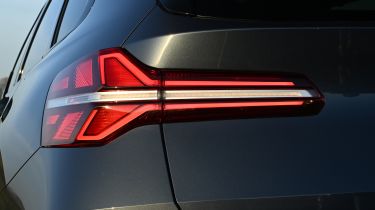BMW X3 review – MPG, running costs & CO2 emissions
“Every engine gets mild or plug-in hybrid tech, and efficiency is strong. The PHEV now has a far greater EV-only range”
It might be a brutish SUV, but somehow BMW’s boffins have given it a drag coefficient of 0.27, which means it isn’t much less slippery than a saloon car. This, coupled with fuel-saving technology, means BMW’s latest combustion engines are reasonably efficient.
Stick with the entry-level petrol engine, and while its 40.9mpg figure is nothing to write home about, it’s also the cheapest to buy – and presumably this will also translate to lower leasing and finance costs. This will make it appealing to private buyers who don’t spend all that much time on the road, and just want a brisk, upmarket SUV.
The 2.0-litre diesel is a bit better suited to long-distance drivers, thanks to its respectable 48.7mpg economy figure that rewards longer stints behind the wheel at decent cruising speeds.
It’s undeniable the PHEV xDrive30e is the star of the show for business drivers and economy-minded folks, though, with its headline 313.9mpg WLTP figure. Like all PHEVs you can take this figure with a pinch of salt, but its 22.3kWh battery and 56-mile EV range mean you’ll go a fair distance before the petrol engine chimes in. This will effectively make it an electric car for a lot of drivers a lot of the time, with the combustion engine to fall back on for longer trips or bursts of performance.
More reviews
This is a vast improvement from the 29-mile range of the outgoing X3 PHEV, but it’s only middle of the pack versus rivals, beating the 37-mile range of the Audi Q5 TFSIe, but some way short of the Mercedes GLC 300 e with its impressive 80-mile potential. We also think it’s a shame BMW hasn’t given the X3 xDrive30e DC rapid charging, because it’s limited to 11kW from an AC charger, meaning a 20% to 80% charge takes over two hours.
If you don’t have a charger at home and want the benefits of a hybrid powertrain, the X3 is unfortunately not available with a conventional hybrid setup. It might be worth considering the Lexus NX if this is you, because that car gets a self-charging petrol hybrid system as standard, with mpg in the mid 40s.
At the other end of the X3 scale, the M50 is never going to be a frugal choice. Driven with some deference to economy it should get near its claimed 36.7mpg best, but company drivers will likely steer clear of its 175g/km CO2 emissions, which can rise to 180g/km on larger wheel options.
| Model | Fuel economy | CO2 emissions |
| BMW X3 xDrive20 | 40.9mpg | 156g/km |
| BMW X3 xDrive20d | 48.7mpg | 153g/km |
| BMW X3 xDrive30e | 313.9mpg | 21g/km |
| BMW X3 M50 xDrive | 36.7mpg | 175g/km |
How much will the BMW X3 cost in tax?
Even the entry-level X3 bursts through the £40,000 barrier, so private buyers will need to factor in the expense of the higher rate of VED (road tax) in the first five renewal years.
Business drivers are likely to only be interested in the xDrive30e, because its low CO2 emissions figure means it sits in the 8% Benefit-in-Kind bracket. The next lowest-CO2 version is the diesel, but it finds itself in the 35% bracket, just below the petrol with a high 36% BiK rating.
What will the BMW X3 cost to insure?
There’ a spread of insurance groups from 32 to 42 for the BMW X3 range. No surprises for guessing the 20 xDrive model sits in the lowest bracket and the M50 in the highest. In between that, the 20d xDrive is in group 33, while the PHEV 30e xDrive pushes further up the scale to group 38.














